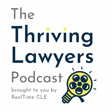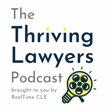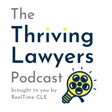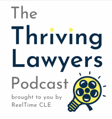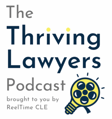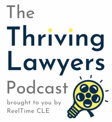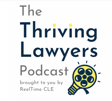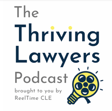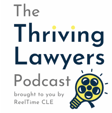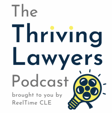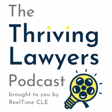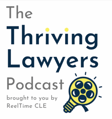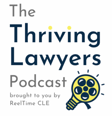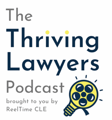Become a Creator today!Start creating today - Share your story with the world!
Start for free
00:00:00
00:00:01

Prof. Heidi Brown, The Introverted, Fear-Untangling, Flourishing Lawyer (Pt. 2)
Just in time for your commute home-or down the hall if you're working from home... Part 2 of Chris' interview with the endearing, engaging, enlightening, and inspiring Prof. Heidi Brown, author of three STANDOUT books on lawyer well-being published by the ABA.
Transcript
Introduction with Professor Heidi Brown
00:00:07
Speaker
Hi, this is Chris. I was born and welcome back to the thriving lawyers podcast in today's episode. I have part two of my delightful conversation with professor Heidi Brown of the Brooklyn law school, where she is the director of the legal writing program. And she's author of several published books. We didn't even get to talk about those last time or her career as a professor. Uh, hang on folks. There's so much, uh, interesting stuff in Heidi's journey.
Personal Challenges and Career Shifts
00:00:32
Speaker
Uh, we were talking during a break and I just love,
00:00:34
Speaker
The realness of it all, the relatability of it all, and I hope there's lots of people hearing this who will draw some encouraging. I have no doubt there will be as there are through Heidi's work in the legal academy. So Heidi, where we left off, you had just taken a kind of a leave of absence from your brand new job in New York.
00:00:55
Speaker
Starting to do some healing some work on yourself to just really grieve the process of everything you had been through all the transitions losing a a Almost you know lifelong relationship from for most of your adult life New city new job new responsibilities everything so catch us up on and then 9-11 happens You're diverted to Newfoundland if you didn't listen episode one folks go back and check it out. It's really just Edge of your seat type stuff at least it is for me
00:01:23
Speaker
Um, so what was that like then you you you're coming back to a different america sorta as you come back in and you're a different person Catch us up on what that was like and where things went from there When I got back from new finland, it was interesting. We had to fly The passengers had to fly back to germany to get back in the united states. And so when I finally got back to new york My the grief over 9 11 sort of supplanted my grief over my marriage my situation
00:01:52
Speaker
which was an interesting shift. I realized how lucky I was to be alive and it motivated me to do something with myself and stop sort of wallowing in regret and shame and all these difficult emotions. So I did.
00:02:11
Speaker
I did not go back to the law firm. I decided I was going to take another month or two to figure out professionally what I was going to do. Okay.
Writing and Teaching Beginnings
00:02:20
Speaker
Started writing. I did a lot of reflective writing to process my own emotions about 9-11. I was living in Chelsea, Manhattan at the time, so we were every day seeing the trucks carrying the debris and just the- Oh, wow. ... that the volunteers and all the
00:02:20
Speaker
I
00:02:40
Speaker
amazing people were doing down at the site. But while that was happening, I started writing my very first legal textbook. I wanted I got this idea. I wanted to write a book for first year attorneys that explain things in a way that might be helpful. It was the dumb question. Yes, yes. You know, there's so many manuals out there for lawyers, but times when you're a new lawyer, you don't even understand what those manuals are saying.
00:03:08
Speaker
So I watched six years or almost seven years of experience I'd had at that time in two different firms, the boutique litigation firm in Virginia, and then my nine or 10 months of experience in the big law firm, and break down federal litigation into steps that a first year attorney could understand. And so I started writing that book, but then two months into that, I thought, okay, I can't be this bohemian, New York writer, artist. I have to actually get a job.
00:03:38
Speaker
You had not taught even as an adjunct prior to that. You hadn't actually taught a class. I never really thought about teaching, but I liked writing. I liked explaining. I had mentored summer associates at the first firm and I had mentored junior associates even as a fifth or sixth year associate, but I'd never taught a class.
00:03:59
Speaker
I love the practical aspect of what you're talking about because I remember having the same feeling when I finished at UVA, you're behind you, land in a small law firm doing insurance defense litigation. They're like, okay, go draft an answer to that complaint. And I'm like, how would that go?
00:04:16
Speaker
What would that look like? I read about the rules about an answer and I did, you know, I did actually okay in Civ Pro, but we didn't draft a thing. And so when do I say admitted or when do I say admitted for lack of information, sufficient form of belief bubble? I mean, there was so much that was like, and it was kind of like, okay, we need this. I'm like, and what would that need to look like? Because I could write an appellate brief, but that wasn't the majority of what you did.
00:04:44
Speaker
You're so right. I mean, the first time I had to draft interrogatories, I had to go look up what the word interrogatory meant. Oh my gosh. The first time I had ever sat in a deposition room was when the firm sent me to St. Louis to defend my first deposition. Wait, to defend. You had not observed a deposition when you had to defend.
00:05:03
Speaker
Right. Oh my gosh. That is just backwards training. I think I maybe had seen one or two when I defended my first one. I think I did defend before I took one at least, but I at least had seen sort of what the rhythm and flow was and had a little bit of prep. Although I will say at the second job I had, I had a partner kind of
00:05:23
Speaker
trying to coach me on a deposition and giving me advice that I later found out was just actually dead wrong and backwards. But that's another story anyway. I agree. I got bad advice on how to negotiate a scheduling order with opposing counsel.
00:05:40
Speaker
I was taught just disagree with everything they say. If they want trial in six months, you want it in two years. If they want it in two years, you want it in six months. I thought that is terrible advice. We have to do the opposite of that. That makes my head spin. Yes, that's so inefficient. Yes. How is the client being served with that? I agree. It's just awful. Gosh.
00:06:01
Speaker
Well, my first book was called Fundamentals of Federal Litigation. But I was writing it. Right after 9-11, I started writing it. But then I needed a
Teaching Experience and Student Empowerment
00:06:09
Speaker
job. So a good friend of mine who had worked with me at the first firm started his own firm. And he knew I could write. And he needed a brief writer that he didn't have to train. So he hired me. This was way before remote working environments. I was about to say, you're predating all of the Zoom and online hybrid type stuff, for sure.
00:06:29
Speaker
I got to work from New York, from my apartment, for about six years for him. And the firm was in Virginia. But then things got busy, and I would have to go fly around taking depositions. Because as you probably remember from construction labs, our cases were kind of all over the country. They weren't local. They were everywhere. You had high-stakes stuff. You had high-stakes stuff with big players, big development projects and stuff. Yes.
00:06:57
Speaker
So for the first six years of that arrangement, five or six years of that arrangement, I worked from New York, but then we had a huge power plant litigation out in California and I was in a different relationship, a new relationship, another long-term relationship. And I call this the great West Coast experiment because to pitch in on the case,
00:07:21
Speaker
I sort of volunteered to go live in California for a while because a lot of our depositions and discovery were out there. The guy I was in a relationship with had a cool job opportunity in California. We road tripped across country with our dog. I call it the Great West Coast Experiment.
00:07:40
Speaker
I got amazing things out of, I missed the East Coast, so I gave five years of my life to the West Coast, but the major thing I got out of that experiment was my teaching career. Okay, how did that happen?
00:07:54
Speaker
So I was working on the power plant litigation, but I had joined a gym and a lady at my gym said, hey, Chapman University Law School in Orange County, California is looking for a legal writing professor. I know that your expertise is sort of in legal writing. You should apply for the job.
00:08:11
Speaker
So this is another great learning experience and pivotal moment. I applied for the job, went through all the hoops that you jumped through to become a full-time faculty member, and I did not get the job. So I came in second. Came in second. I recently had some experience. I won't say anything about that, but I'm feeling you right now.
00:08:30
Speaker
Well, I hope and good news for you because August 25th of 2008 or whatever year it was, Friday before the new semester is starting, the dean of the law school calls me or the vice dean and says,
00:08:45
Speaker
We have too many students. We need another legal writing professor. Can you start on Monday? Oh my gosh. Oh wow. And I said yes. Even though I had no syllabus, I'd never taught anything. I had no textbook. I didn't know what I was doing. I said yes. Wow.
00:09:01
Speaker
Wow. That was brave. I was still practicing for the firm because I couldn't leave that. And so I was trying to do both at the same time, which I don't recommend to anybody. It's very time consuming. But I walked into my first law school classroom on that Monday. And luckily, my colleagues shared their syllabi. Oh, sure. Sure. They're like here. We'll look you up, don't worry. We'll make you look like you actually might know what you're doing. OK. Just fake it till you make it.
00:09:26
Speaker
But I was terrified. And I'm actually not the fake it till you make it girl because I can't fake it. My face turns red. That's right. You have the blushing tell, as we talked about last time. I have blushing tell. And I forgot too how significant that was that you said yes because you didn't like the moot court, didn't like the on your feet stuff. You wanted to just do the writing. Let me and my research and writing happen. So what was that like to say yes to yes, I'll be in front of the class all the time.
00:09:53
Speaker
It was, at first it was terrifying. And, but I would, again, just like law school, I would walk into the classroom with my binders of class notes and, and my class plans. And I was super prepared, but I had a lot of self doubt because I thought, and the students were so smart, you know, law students ask a ton of questions. And I thought at the time, and now 14 years later, I realized how wrong I was, but at the time I thought, I have to know the answer to every question or I'm going to look like a fraud.
00:10:23
Speaker
Right. And so I tried to fake it and that was terrible and it didn't work. And I learned throughout that first year of teaching that it's so much better to say, huh, you know, that's a great question. I don't know the answer to that question. Let's look it up and use it as like a research.
00:10:43
Speaker
Lesson it's great. Yes, because that's what you're trying to teach them to do anyway It's like yeah, we you've come up with a new angle We need to explore this and that's what we do as lawyers all the doubt on time Absolutely, and and sometimes I would try to answer the question if I got it wrong I would make sure the next class I would come back man didn't get it wrong a ton. I don't want you to think I'm a terrible but I would use the ordinary human amount and
00:11:09
Speaker
The ordinary human amount of wrongness, which we all experience sometimes. Definitely. I felt like I was teaching my students intellectual humility. We can say we don't know everything. We can admit when we make mistakes. We can correct those mistakes.
00:11:26
Speaker
Explore different ways of solving problems and so that was I've realized in that first year, even though obviously I made mistakes as a new teacher, but I loved teaching. I love listeners can't see us, but I'm doing like a happy dance like you're resounding you're sounding so many concepts.
00:11:45
Speaker
that are so helpful. They've been part of what my work in the continuing legal education work has been about. My partner, my business is a former lawyer turned mental health therapist. And we've been trying to normalize that kind of conversation of, I love that word, intellectual humility that you used. And like, no, this job is not about knowing all the answers. It's often, in fact, that's
00:12:08
Speaker
That's dangerous. If you think you know all the answers, you need to be careful versus having that, you know, I think I've done this before, but this could be different. That curiosity and humility is powerful. It was a really... Yeah. So you discovered... It was a really eye-opening experience. So then you discover in the process, you are enjoying the teaching about it. And what about it grabbed you? When did you have that moment that you're like, oh man, this is my thing.
00:12:35
Speaker
The students are just incredible. I mean, not only just the classroom dynamic, which was great, but seeing them evolve as legal writers and what I noticed over that first year, which is what led into my books, is that my most creative problem solvers, my most thoughtful legal writers,
00:12:55
Speaker
My, they would come up with the coolest ideas were the quietest students. They were not the students with their hands in the air. Right. Cause I grade anonymous. Most, a lot of legal writing professors grade anonymously. So the students write with pseudonyms. And when I did the big reveal, I kept seeing that my top performers in the class, I had small sections, but my top two or three students every time were the quietest students. Wow. And then they came to me and would confide to me.
00:13:25
Speaker
I'm scared of the Socratic method. I'm scared of being cold called. I don't want to try out for moot court, even though I can probably do it, but I don't want to do it. That showed me, oh my goodness, these students are me. Yes, yes. Nobody, I didn't know that I could ask for help or nobody gave me the kind of advice that was helpful. So I thought maybe I could do that for them. Oh, I love that. I absolutely love that.
00:13:51
Speaker
And it got me researching quiet, quietude, you know, introversion. Yes. Social anxiety, which is completely different from introversion, obviously, but what is shyness? What is social anxiety? How does that play into the law school classroom? Can we as educators and the profession do a better job of, of making sure that quiet individuals who have incredible ideas, yes, incredible minds and, and,
00:14:19
Speaker
valuable offerings to the profession, can we do more to help them understand they belong but also amplify their voices authentically without taking it until they make it?
The Introverted Lawyer and Beyond
00:14:30
Speaker
Yes, and I want to underscore how groundbreaking this was. I remember when your book came out, I remember saying like, nobody's thinking like this. In my experience, I taught law school for a little while and I've been doing CLE for a long time. And this is a whole different way of looking at it because what is Harold did
00:14:46
Speaker
A lot of our listeners are going to be lawyers who have been to law school and all, but what's heralded is quick on your feet. Let's put it this way. They don't make Netflix dramas, TV shows, or movies about the lawyer who's doing the research and writing. Maybe they'll do occasionally, oh, I found a great case, sir. But by and large, what's celebrated is the upfront, the performance aspect of it. And candidly, that was more me. I'm more of an extrovert by nature.
00:15:12
Speaker
give me a crowd, I like to talk, give me a mic, all that. And I wrestle with when I have to write something, okay, I can do it and I'll do it, but I'd rather be in front of people. But both those skill sets are huge. Neither one could I do without in the practice of law.
00:15:30
Speaker
and finding where people have a lane. And there's some people like, I remember at my law firm, I'll tell a quick story. There was a small time period where I was in charge of the litigation department. They called me litigation department chair. It meant nothing. It was a small litigation department. It was about seven or eight of us.
00:15:47
Speaker
It was just make sure we have meetings, you know, and talk about, are we marketing, blah, blah, blah. It was not like I was running stuff. But one of the few things I did was I brought in a bunch of knives from my kitchen and we looked at them and we said, you know, how are, what are these knives? You know, they're all used for cutting, right?
00:16:03
Speaker
You know, if I'm giving you an apple, do you want this one? And I hand them a butter knife. They're like, well, really? No. Okay. Well, you're cutting three bread. Do you want this one? I hand them just like a little paring knife. Well, no. Even though we're all knives in litigation, some of us might be the serrated edge. Some of us might be the smooth long fillet thing.
00:16:22
Speaker
wonder what could we look at that and see and we talked about we had this great conversation we realized we had one guy who was the TRO man like if you had to go somewhere and things were on fire he loved that he would be engaged he would be on if you needed a complaint drafted to start something he's not your guy
00:16:39
Speaker
And I'm like, that's kind of like me. There was somebody else who's like, please don't ever send me anywhere on an emergency basis. But if you need to draft things and make sure they're moving forward and keep up deadlines, that's your girl. And it was, I think, I don't know what we did with it. We didn't like change jobs, but we at least recognized, oh, let's think about differently about who we use for what pieces
00:16:59
Speaker
And we might conserve our clients better. But you're doing this on this massive level and connecting with these students. So how did that go? They start coming to you and appreciating that. How did that turn then into the first book?
00:17:12
Speaker
It took a little bit of time, because I also didn't really understand law school hierarchy and structure at all. Oh, yes, there's that. I did not understand it. So I had all these ideas, and I'm like, I want to try these 20 things. So I had to learn about the process of writing and producing what is called scholarship. I actually didn't know that term. I'll admit, I was not on Law Review at University of Virginia Law School.
00:17:39
Speaker
I didn't know what it meant to write a lot of your article, et cetera. While I taught at Chapman for three years, and I really got to know my students and understanding oral argument, anxiety, et cetera, at the time I was really missing New York City. New York had gotten into my system, so I was ready to move home.
00:17:59
Speaker
So I applied for a job at New York Law School in Tribeca and I got hired to be part of this amazing new program they designed back in 2011 called Legal Practice and they pulled 15 professors who had diverse practice backgrounds.
00:18:18
Speaker
And I moved back across country. And when I did that, I think the last year I was at Chapman, though. Chapman was really supportive, even though I was a legal writing person, had never written before. They gave me a summer research stipend to write my first article, which was called The Silent But Gifted Law Student. And I was looking into
00:18:38
Speaker
the science behind helping the introverted students. That started at Chapman, thankfully, to their summer stipend support. I moved back to New York. I joined this legal practice program at New York Law School, and then I really dove headfirst into the research on introversion.
00:18:55
Speaker
And I started doing workshops at the law school about all the research I was reading about, because obviously I've shared, I grappled with public speaking anxiety. I found this awesome book, the only helpful book I'd ever found on it by a woman named Ivy Naistat.
00:19:13
Speaker
And she wrote a book called Speak Without Fear. And it was all about the physicality of anxiety. Not fake it till you make it stuff. It was like, what's going on in your physical body? What negative messages are you telling yourself? And how does that show up? How does that show up in your body? Which, of course, is not a topic that we encountered in law school of like, oh, you're a physical being having a physical somatic experience. That was nowhere. And if anybody had started talking like that, quite honestly, I would have said, y'all are nuts. And going back to reading my constitutional law book.
00:19:43
Speaker
You just use the word somatic. Yes, there's this whole body of research called somatic intelligence. And I like at the time I was studying emotional intelligence, but it led me into somatic intelligence. Yes. So fast forward. I worked at New York Law School for four years. And then the director position at Brooklyn Law School opened up. So not to delve into law school hierarchy, but I was never eligible for tenure track at any of
00:20:11
Speaker
that the first two schools, but when the director position opened at Brooklyn Law School, I was open, I was eligible for tenure track and I was publishing. By that point, I think I'd written maybe three or four articles and I'd written not only the litigation manual, but a legal writing textbook as well.
00:20:29
Speaker
But what I'm really excited about is when I accepted the job at Brooklyn Law School, at the same time, I also got my first contract from ABA to publish a book called The Introverted Lawyer. Yes. And so I spent a year writing that book, The Introverted Lawyer, which is still my favorite book.
00:20:50
Speaker
Based on the articles that I'd written about the quiet. Yes, kind of compiling it into more of a resource for the listeners. I'm a big fan of a podcast called Smartless. I don't know if you ever listened to it. I can't remember if we talked about it, but they always explain stuff for listeners who might not be as familiar with the lingo, but for anybody out there.
00:21:10
Speaker
Law review articles are published in journals. Every law school has at least one, several, but what Heidi's talking about is taking some of that base work, but turning into more of a book like you would see on the shelf where you can order from the ABA, and you should, and you can get on Amazon too, but it's more of a practical guide for the actual either a lawyer or a law student who is like, oh, that might resonate with me.
00:21:35
Speaker
Exactly. Because the articles were read by law professors at the time. So I was writing the articles with an eye toward, here's how you, a professor, could help our quiet students. Yes. And not just tell them, just do it. That great Nike slogan. But that's what I heard all the time. Just do it. Just practice. You'll be fine. That didn't work. Well, I've had a professor. And if you would have had this professor at UVA, and I will not name him, but I remember him saying, oh, come on. At least make a noise like Aloya.
00:22:04
Speaker
I'm like, that doesn't sound like helpful advice to me. As I look back and when I taught law school for I'm like, I'm not going to do it that way. I don't think that's right.
00:22:14
Speaker
So you're absolutely right that the book turned into this practical, it's actually seven steps. It's funny because I think I had like 10 steps and my editor's like, I think you only really need seven. So I cut it down to seven steps about how we can use mental reflection and physical reflection to step into performance moments authentically. So it's all about- Wow.
00:22:38
Speaker
highlighting the strengths that introverts bring to the profession because they get kind of overlooked. But also because we don't have the luxury of just sitting in our quiet spaces, not talking anything. We have to amplify our voices. The seven steps are how we can amplify our voices authentically using our introverted gifts, not. And I love that.
00:22:58
Speaker
I love that because you're not saying, hey, go find a library bookworm job and hide away and you'll be fine. You're saying if you want to do more than that, you can. Here's how to be true to yourself in doing that and leverage the unique gifts and strengths that you bring, which I think is genius because it's saying you can do more. You don't have to. But if you want to actually function as who you are,
00:23:21
Speaker
in this world, particularly if you are doing litigation, maybe one day you're tired of writing the briefs and you want to appear before the court and stand up for what you've done, the way to do it, laying it out, that's beautiful. Definitely. Because I don't want law students or lawyers to feel like they are pigeonholed into one type of law or one type of practice because people have told them they have a certain personality type. Any personality type can do any aspect and
00:23:48
Speaker
and type of law once we get to know ourselves and understand how we can best function. And to me, it's different for everybody. In researching the new books, I came across this cool athlete concept called, it's by a Russian sports psychologist named Dr. Yuri Hannon, H-A-N-O-S. He developed this concept called Individual Zone of Optimal Functioning. It's ISOF.
00:24:15
Speaker
And he says athletes are not one size fits all. Every athlete, even if you pick one sport, every athlete in that sport has a different zone of optimal functioning based on their emotions. Some people can be really motivated by
00:24:31
Speaker
Anger other people cannot perform when they're angry. I'm other people like ice water Some of them are like always cool and others are the ones, you know, come on and yelling at their you know Let's get into it and you need you know, all those components really
00:24:46
Speaker
And we need to be able to look at ourselves and not pretend, but actually take the time to analyze ourselves emotionally, cognitively, and physically, somatically, to use your word. Because if we get, and this is why I want law students to get a little touchy-feely about this stuff, because if they can really get to know themselves, they'll understand how to set themselves up.
00:25:09
Speaker
to perform at their best, whether it's in the classroom, whether it's in an oral argument, whether it's on an exam, on the bar exam, in an interview, and we can toggle ourselves in and out of that optimal zone.
00:25:22
Speaker
I like the toggling idea and I love just it. It seems more commonsensical now, but especially as you've sort of pioneered a lot of this, it's a radical concept because I know I think I came out of law school and even into law practice like what's kind of one size fits all. Don't we all do kind of the same thing and need to look the same way doing it and here's all the people who are the best at it seem to look this way. It took me a long time
Emotional Awareness in Law
00:25:45
Speaker
to realize actually that i was a good litigator i litigated for a long time but i'm actually more of a peacemaker and a mediator i like discovered mediation and collaborative i'm like oh that's i like that better i can do that other stuff but i think i'm being more true to myself if i do this uh in another digression but when i'm teaching and when i started doing presentations i'm like i'm alive in a different way
00:26:10
Speaker
when I'm doing that sort of thing than when I am arguing a summary judgment motion or whatever. And I think the opportunities to pause and do that are few and far between if you just kind of go with the way that things flow. What's it been like to bring these concepts? So you wrote the introverted lawyer and then the detangling fear in law. What's it been like to bring those concepts into the law school realm where
00:26:35
Speaker
fear and all these different styles are are very very present and kind of in a way on display you almost have like a little lab it's been wonderful i mean i do there i still do still experience resistance i would imagine but the students i always make this stuff optional and it's always incredible to me when students opt in to take a different approach to their own learning and to really understand how they learn
00:27:02
Speaker
what obstacles get in their way of learning, but also how they can... I like the verb untangling because my whole life I was told, just face your fears, just do something every day that scares you, conquer your fears. No. That's too simplistic. I tried doing that. Some of those fears are nasty and they show up in ways you're not planning on them showing up.
00:27:27
Speaker
It just doesn't work to pretend fear is no big deal. And it also doesn't work to act like some people say, well, fear is good for you. It's a great motivator. For me, that doesn't work. So I need to take my fear and pick it apart and untangle maybe the slightly good parts of it if they're already from the toxic parts.
00:27:48
Speaker
And if you don't do that, the fear is never going to go away. I don't even like the messages. I know they're supposed to be empowering, but a lot of people are like, do it scared. That has a really detrimental mental health effect on a lot of people, and I'm one of them. So instead, I'm a huge advocate for, like with that partner I mentioned, let's sit down and be open and honest about fear, understand the science behind it, how it affects our bodies.
00:28:18
Speaker
And then understand what is really happening when we're afraid. It's not really about the deposition or the judge or the oral argument or the opposing counsel. It's about something much deeper. And unless you're willing to go there, nothing's going to change.
00:28:34
Speaker
And would you say, because this is an area of sort of interest that I've been doing some research in, partly based on my different background and experience that I've had, but you say that sort of exploring your story, kind of your family of origin, but not in just like a Freudian psycho way, but exploring the formative events of not just law school, but your childhood, the things that have
00:28:55
Speaker
you know, made you who you are is a piece of that. Like, why do you know some of us get more excited about being on the stage? My wife says that's my worst nightmare. I don't want to be on the stage. We actually took an improv class a few months ago for her to kind of stretch out a little bit. She's like, that's my nightmare. I'm like, that's my happy place. But why? There were reasons for that from our background that she had a terror and I had a please that looks fun. Would you say that's a piece of it is sort of
00:29:23
Speaker
getting to know yourself and where you've come from and what's formed you.
00:29:26
Speaker
Absolutely. And it's hard to do, but it's so important. I mean, for me, I had to, especially with the negative mental soundtrack that I have, I had to go back and reflect on where that started. And I've vivid memories of fifth grade, this stuff. And then this is not the book I mentioned by Ivy Nastat. She actually says, this is not a blame game. We're not going back to call up our parents or our teachers or coaches and say, you ruined my life.
00:29:53
Speaker
Instead, it's information, and we get to now decide in 2023 that we may have internalized those messages decades ago, but we can reject them and eject them and delete them now. Nobody's going to do that for us, so we have to do it ourselves.
00:30:11
Speaker
Yes. And with what we're learning about trauma as well and how traumatic experiences are literally stored in the body. I know you're a fan from the book of, we're both fans of Bessel van der Kolk. The body keeps the score. Trauma, traumatic experiences get stored in our body, fragmented in different places. And when we run into them is sort of when we run into a piece of them or whatever. And part of what
00:30:33
Speaker
at least my experience has been in sort of therapy and story type experiences, is we get a chance to reintegrate. We get a chance to look back on those experiences and sort of give them their right place. I'll share a quick anecdote. I remember when I was starting to do some counseling and therapeutic unpacking of sort of my story of the past. I remember
00:30:51
Speaker
a close relative saying to me, why do you want to dredge up the past? Why are you trying to go dig back in the past? I said, I'm actually not trying to dig up the past. I'm trying to find out why it keeps showing up and biting me on the ass, because I'd like to not have that happen. And I think that's a piece of why I, a very mild-mannered, calm-looking person, could lose my shit sometimes, excuse me, and act like an idiot. I'm like, that doesn't feel like me, but boy, it was really coming from somewhere.
00:31:19
Speaker
probably need to unpack that, but you learn. I love your use of the phrase of data. You get data about yourself that can be helpful and you can say, hey, I'm going to run into this situation. Again, one of our workshops actually comes from a time period when I was in practice. I kept running into these older men and having these battles in litigation where there was a lot more intensity and
00:31:42
Speaker
anger on my part i would end up yelling or kind of hanging up the phone or just getting out of my head i'm like what is going on it keeps happening um and then i realized well in all these stories there's one common character and it's me you know i was worried i'm running to all these terrible people i'm only but i'm there every time maybe i can i can't control how they act or what they're gonna do but what can i do to show up differently myself
00:32:07
Speaker
Yes, I completely agree. For me to do that, I have to do it through writing and through journaling. I also put myself in boxing lessons because for me the somatic aspects of the fear and the anxiety and the blushing and all that is
00:32:23
Speaker
affects me emotionally and even the boxing lessons. I joke with my boxing trainer because I do one-on-one training with a former professional boxer and I tell him every session is like a philosophy lesson because when I'm struggling with my breathing, he helps me realize
00:32:41
Speaker
that it has nothing to do with the activity we're doing right now. It's this fear of running out of air that I had 20 years ago when I was standing up in front of a court or in high school or as a kid.
00:32:57
Speaker
So it's so brilliant the way that the things that we can do and study about our minds and our emotions and our bodies now as lawyers, as law students, lawyers, professors, judges, paralegals, court reporters, whatever contributor to the profession, because I think this applies to everybody. If we take the time to do that, it can change our whole approach to our day-to-day
Balancing Career and Personal Growth
00:33:19
Speaker
job.
00:33:19
Speaker
Well, that's what I've been learning about how the mind and body are way more connected than I ever realized. I was sort of, because of my story, kind of became very, you know, analytical, good student, succeeding in school became my cache. That was, I wasn't the athlete.
00:33:36
Speaker
I wasn't great with the girls. I was everybody's best friend, you know, and all that. So I wasn't finding success. But academically, I could do some calculus, you know, and be on the debate team and all that. But it was a very cerebral type place to be. And I heard a great speaker recently talking about how, you know, law draws a lot of cerebral analytical left brain type. Some of it we make people that way. Some of it it draws it.
00:33:59
Speaker
But in a lot of cases, that's what some of us have adopted as our way of not necessarily being as present for the painful or difficult things. Like, I'm sad. That hurts. I don't like being rejected. All that. We're like, I'm going to go over here and be smart. And it seems to work for a while. And it worked for me, I would say, for a while until it didn't.
00:34:20
Speaker
And then you have to sort of figure out what else can I do. My brain and the left side of my brain is not going to get me through everything, even in the practice of law. Because that was the other thing. I used to avoid the practice of family law because I'm like, I want to be in oddly enough construction law where everybody's rational and makes thoughtful decisions all the time. That was not true in my experience. Sounds like it probably wasn't for yours either.
00:34:43
Speaker
No, it definitely wasn't. Yes. Lots of fighting. Lots of fighting. Yes. So Heidi, I want to be mindful of our time here. Do you have a few more minutes so we can go? I want to ask a little bit about a new from the boxing story from The Flourishing Lawyer. Can you say a little bit more about how the latest book The Flourishing Lawyer came to be? Because if I understand correctly, you wrote that at another pivotal time in the history of America and New York, i.e. pandemic 2020 and 2021.
00:35:11
Speaker
I had, right before the pandemic, I got tenure. So I was, that was a journey, a pivotal moment. And at the same time, I had applied for the master's in applied positive psychology program at University of Pennsylvania.
00:35:27
Speaker
And I got accepted at the same time that the pandemic hit and I had to shift my entire writing program on online so we can deliver our academic curriculum remotely. So what I thought was going to be kind of a calm time in my professional life because I'd finally gotten tenure, it was not. It was the opposite. Let me just take on something else completely.
00:35:49
Speaker
Oh my goodness. And at the same time, I had pitched a third book concept to my publisher, ABA, which they accepted. So I had the first year of the pandemic. I don't think I've ever been busier in my life. Wow. But the book, I decided to write a book about wellbeing through a performance lens.
00:36:11
Speaker
because a lot of the things that you and I've spoken about, it's not, I don't want wellbeing. Sometimes when I talk about wellbeing to well-meaning colleagues, they think I'm just talking about meditation and yoga and I'm not. I'm talking about athletic performance as a, because I think we are athletes. We're scholar athletes or scholar performers if the athlete model doesn't work for some people.
00:36:33
Speaker
And elite athletes do this stuff. I remember somebody hooking me. We were doing a teaching a boxing exercise with a psychologist lawyer named Jan Newman. And she said, you know, who else uses a breathing exercise like we're doing snipers, Navy SEALs? You know, it's like just just so you know, people who are tough and have really important stuff to do, they are actually paying attention to their breathing.
00:36:56
Speaker
They are. And so it's not a bad idea for you too as well. It's not woo woo just for the people with the crystals and hookah pipes and stuff. Right. So the book goes into that. It kind of looks at the concept of character and fitness to practice law, but through a well-being lens. What does it mean to cultivate our character over a lifelong journey? What does it mean to be multi-dimensionally fit? And it goes into 10 different dimensions of fitness, but it starts with the physical one, the somatic awareness level of fitness.
00:37:25
Speaker
And I love that you start there because that is literally the opposite of law school because I know, I mean, again, we were at the same law school and what we got socialized into was you work hard, but you party hard. We had Feb Club where everybody goes and you drink a lot during February and you just sort of.
00:37:42
Speaker
We start socializing people, and there's of course great studies by Larry Krieger and Sheldon about this, but we basically say, this is what your life is going to be. It's going to suck and be really hard, but you can party hard and blah, blah, blah. But other than that, there's not that much saying, hey, are you cultivating your physical health? And by the way, that will affect how you practice as a lawyer.
00:38:02
Speaker
started thinking about this and doing presentations on it because I was running into it and nobody had prepared me for that. I'm like, what is going wrong here? So that's huge. I love that approach that you're starting with the body and then seeing how it all integrates together. Say more about that.
00:38:17
Speaker
It does. So the first chapter on the physical side of it kind of sets up the rest of the book because it sets up what's going, you know, getting to know our physical selves, noticing what's happening to us physically, but also adopting sort of routines and rituals like an athlete would for when we're noticing stress or anxiety, physical manifestations, what we can do to recalibrate.
00:38:40
Speaker
And so then the rest of the book it deals with like emotional, our emotional fitness, our social fitness, even a creative artistic side. And in every chapter, it echoes the refrain from the physical chapter because we can
00:38:56
Speaker
layer all those other things on top of our physical awareness. Because for me, whenever I'm in a stressful performance moment, or in that moment in the classroom, and I don't know the answer, or I'm in a stressful faculty meeting, or I'm having a conflict with somebody, the physical always grips me first. And I have to remind myself every time, okay, wait, you've prepared for this, you know what you're doing, practice what you preach. You have tools for that, yes.
00:39:22
Speaker
and it all I mean it doesn't always go perfectly obviously but it really helps maintain you know in the book and I learned this at Penn in the in the master's program that
00:39:34
Speaker
that well-being is two-pronged.
Influence on Legal Education
00:39:36
Speaker
It's not just feeling good because we're not always going to feel good. The most important prong is functioning well. And so we set up a system so we can function well even when we're stressed and anxious or sad or feeling the trauma kind of reviving itself.
00:39:52
Speaker
That was helpful for me to learn, and I've got lots of friends who've done the map and people whose work I respect. Ann Bradford with the Institute for Wellbeing and Law and Paul Well at Penn. There's some great folks doing this stuff. And two things I want to underscore kind of for our listeners that I think are important. One is, I love how you have positioned this as
00:40:15
Speaker
There's not like a perfection that you achieve or a nirvana state that you reach and like you're never having to do the things you're talking about. You are continually having to practice these things and put them in place. And if you think you get it down, here comes a curveball, here comes a challenge. And you're learning to be able to adapt. And again, that's like an athlete, like a fighter. They can't train you for everything. But I love that mindset. It's not like, hey, be this perfect, you know, Gandhi type, you know, woo woo type thing.
00:40:44
Speaker
I love that piece of it, and I love how just real you are about it, that you still have to, you know, it's not gonna work all the time, even if you're working. You got a master's, you're a master now, right? But the other thing that you explained that I had to find out too was when I first heard, oh, positive psychology ceiling. And I thought, oh, is that like Norman Vincent Peale, be happy and blah, blah, blah. But it is way more robust than that, because you can't just be happy when bad stuff happens.
00:41:13
Speaker
I tell a story in some of our workshops one time. There's a lot of context to it, but I actually had a case where I filed a motion for summary judgment against my own client. Like my client profiled a motion to get summary judgment against us because we were getting taken down for a ride. Somebody was saying, you violate these statutes, we're going to get a bunch of money. And we want the judge to say, hey, yeah, they violate these statutes, but the remedy is only this. It's not what you think it is. So I literally asked for summary judgment against my own client to shut up this craziness, and we lost.
00:41:43
Speaker
I'm like, how has that happened? And I remember just feeling like a sledgehammer hit me in the face. And from there, I went and drove and sat in a park and stared at a wall of trees. And I didn't know what to do. But something in me knew, I can't just go back and sit at my desk and start working on the next case or blah, blah, blah. I'm like, what just happened here? I thought I had this genius moved out with this person and it did not go well.
00:42:05
Speaker
Anyway, a side diversion, but I love that positive psychology equips you to face hard stuff. It means, hey, be sad when you're supposed to be sad. Grieve. That's a piece of it. Is that fair?
00:42:19
Speaker
It's totally fair. And just a most recent example, at the end of the semester that we just finished, I was going to treat myself with this trip to Rome, and I was going to grade my papers and work on a new writing project over there. And day three of my three-week winter break, I got COVID. Oh, gosh.
00:42:41
Speaker
I was so bummed out because I felt like I've done all the quote, right things. And I set myself up for this time period to really tend to myself. Rome's my favorite place in the world. I do my best writing there. I wrote my fear book there.
00:42:58
Speaker
and I got sick and I was sick for nine days and none of my stuff, none of my usual routines were working. I do, you know, Julia Cameron, the author of The Artist's Way, she has this technique called morning pages. I do my morning pages every day. I exercise every day. I do a lot of other things to help my mental health and none of it was working. I went into a really dark funk when I was, I had COVID this time and I realized, wait,
00:43:27
Speaker
That's okay. Like my body just needs to shut down for a couple of weeks. That's, I'm not going to be productive for a couple of weeks. None of that. Yeah. You've got a different mix of circumstances that you've ever had and what worked before. And I love the giving yourself permission to just, Hey, even though I wrote the DAG on book, I'm having a not so flourishy day.
00:43:49
Speaker
I did, I had a really hard mental and emotional time with it, and I was mad at myself, because I thought, I should know what to do. And I thought, you know what I know what to do? I know that there's a lesson in this, and I just don't know what it is yet. And I still don't. I'm home now, I'm gearing up to teach. I don't know what the lesson from Rome was for me, but I know there is one. And it'll come to me when it's supposed to come to me to sound a little woo woo, but it'll come to me.
00:44:15
Speaker
Well, I love it and I love this conversation. I could go on forever because it's actually helpful for me with lots of different things I'm thinking on. I'm realizing how hard on myself I can be when I don't function well, when I don't do the things I know to do. An example this week, my wife is traveling, I need to get in bed, but I pathologically stay up.
00:44:35
Speaker
I don't know what it is, but I watch TV and just binge stuff, and I'm like, when it happens, and it didn't happen one night, one night I got in bed at the right time, another night off the rails, and I start beating myself up and like, well, let me shame myself back into doing the right thing.
00:44:52
Speaker
That never works. It certainly never lasts. This has been helpful to remind me of that too, that even as you're trying to get better and flourish better, you're not going to do it all the time and that is okay. I think we're missing that or have been, at least in my legal career, that's been missed a lot, not everywhere. At some law firms, I had good mentors and people had a good mindset. But it's easy to forget things like that and to feel like we have to perform all the time because we're smart and we're high achievers. Yes.
00:45:22
Speaker
Yes. Well, I want to wrap there for the sake of your time. I might see if you want to come back and do an episode three sometime down the road when we have time because there's more in the flourishing lawyer that we can get to. We didn't even get to talk about Bono and U2 and that would have been fun. My favorite topic.
00:45:37
Speaker
Exactly. So maybe we'll have episode three will be, you know, we'll start there and see if we if we have some time, let you get started on the semester. But thank you so much for being with us. Please check out Heidi's books at the ABA and you can get them all on Amazon. I'm sure as well. I think that's where I got them. The flourishing lawyer is fantastic. And what I would commend you. It's an enjoyable read. If you think legal professors, law professors, write stuffy, academic wonky stuff that only other pointy headed academic people would like.
00:46:07
Speaker
Heidi will prove you wrong because it's an enjoyable read, you'll smile, you'll enjoy it, and it's because you'll get more of what you got in these two episodes of just a real person going through their life, willing to talk about it, share with other people about it, and being a light and encouragement to so many other people along the way and helping them thrive. So thank you, Heidi, so much for being with us. Thank you. I really appreciate it.
00:46:32
Speaker
Thanks for listening to this episode of the Thriving Lawyers Podcast. We love hearing from our loyal listeners, so please feel free to email us any questions, comments, suggested topics, or guest recommendations at the following address, feedback at thrivinglawyerspodcast.com.
00:46:47
Speaker
The Thriving Lawyers Podcast is brought to you by Real-Time Creative Learning Experiences, a national provider of continuing legal education and professional development programs that leave participants engaged, encouraged, and equipped to pursue meaningful and sustainable change in their practices, their lives, and the organizations they work in. And by Osborne Conflict Resolution, your experience guides through the uncharted terrain of business and family law disputes based out of Charlotte, North Carolina. Thanks for listening, and we'll see you next time on The Thriving Lawyers Podcast.
